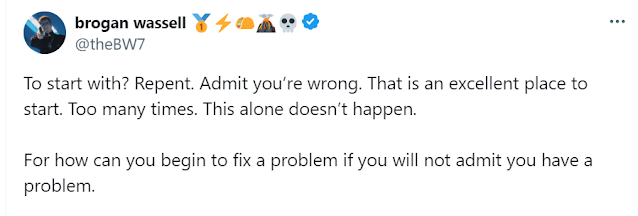In a recent debate on social media a woman asked the following reasonable question:
To which she received the following reasonable reply:
A leftist thought this to be a good opportunity to win over women to his side:
Which led to this exchange:
So here we have the modernist idea that there is no objective good, or, to put it differently, whatever we seek becomes by definition "the good". This is similar to the Hobbesian view as described below by Michael Allen Gillespie:
We are all only individual beings, determined by our idiosyncratic passions. Good and evil for each of us is thus measured not by our progress toward a rational, natural, or supernatural end but by the vector of our desire. No direction is naturally better than any other. Good is what pleases us, evil what displeases us, good what reinforces our motion, evil what hinders it.I responded as follows:
What all this made me think of is that the concept of entropy is underused within traditionalist thinking. It is particularly useful because it is so widely accepted within science, which has a certain prestige within modern thought.
Entropy is the idea that systems of any sort do not naturally maintain themselves but will tend toward increasing disorder and decay unless sufficient energy is applied to combating entropy. This is something we are likely to experience in our own lives as we age. To maintain the same muscle mass as we get older requires an active effort in the gym; what begin as bad habits solidify over time into vices that are increasingly difficult to wind back and so on. Eventually entropy wins, but it is part of our natures to resist and to seek to maintain the order and integrity of our persons and our cultures.
The respected intellectual Steven Pinker puts it this way:
The…ultimate purpose of life, mind, and human striving: to deploy energy and information to fight back the tide of entropy and carve out refuges of beneficial order.
And here's the thing. Political liberalism is by nature entropic. It says to people that there is no objective good to be pursued, but that we should act on "what is in our mind" or according to "the vector of our desire". But all this does is to set ourselves, and our communities, more passively in the flow of entropy that is embedded into the reality we inhabit.
The concept of entropy, whilst not being Christian in and of itself, is an easy entry point into aspects of Christianity. It suggests that there is something like a "logos" embedded into the nature of reality, a kind of higher ordering principle that needs to be actively upheld. It fits in, too, with a Christian virtue ethics, in which there are dissolute vices to avoid, but also ordering virtues that we should discipline ourselves to, to form good habits that maintain our integrity of person.
It is interesting that Jordan Peterson became famous for advising people to clean their rooms. I haven't read his book, so don't know the surrounding context of this, but consider the following online description (by an unnamed author) of what entropy means:
Combatting entropy requires energy. When you clean a messy house, you use energy to return the house to a previous, simpler, tidier state. This is why entropy is nature’s tax. You need to expend energy just to maintain the current state. Failing to pay nature’s tax means things get more complicated, disorganized, and messier.
We cannot expect anything to stay the way we leave it. To maintain our health, relationships, careers, skills, knowledge, societies, and possessions requires never-ending effort and vigilance.
Perhaps cleaning your room is just accepting a mindset that we need to direct energy toward "negentropy":
Negentropy is reverse entropy. It means things becoming more in order. By 'order' is meant organisation, structure and function: the opposite of randomness or chaos.
At least some of Peterson's followers have ended up converting to Christianity:
A Catholic priest who attended the Providence show confirmed that "a fair number" of recent converts he's encountered at Mass said they came to the faith after listening to Peterson.One final point. A mistaken conclusion to be drawn from this is that we need authoritarian government to provide the "strong arm" to combat entropy in society. I don't think this is so. The Chinese government is authoritarian, but signs are that the Chinese are failing just as much as we in the West to uphold the kind of values that would help their society to survive into the future. For instance, here are Chinese people explaining why they chose not to have children:
Young people are more focused on ourselves and we don't think about the future, we just think about what makes us happy, because if you have children it costs lots of money and lots of time.
Beijing resident Four Wang, 42, and his wife have decided it is too much of a risk. "It would be just like opening a mystery box," Mr Wang said. "I have no courage to open it." The finance worker said a child would be expensive and could reduce his quality of life. The money I saved can be used for shopping," he said. "I won't need to worry about children's lives, health, safety, et cetera."
What matters is the metaphysics that people live by; the social and cultural norms within a community; and the ability of individuals to self-regulate toward a common good. To come at this from a different angle, the more that a community gets its settings right, at the level of individual, family and local government, the less that any intrusive government overreach can be justified.




